7 key takeaways from the Chauvin trial as the prosecution rests its case
The prosecution rested its case Tuesday against Derek Chauvin, theformer Minneapolis police officer standing trial for murder in the death George Floyd, arguing that Chauvin’s use of force to subdue Floyd was excessive, unjustified and ultimately killed him.
The state wrapped up its case Monday with testimony from Dr. Jonathan Rich, a cardiologist at Northwestern Memorial in Chicago, use-of-force expert Seth Stoughton and Philonise Floyd, the victim’s younger brother.
In an emotional and brief testimony, Philonise Floyd talked about his brother’s childhood, his talent for basketball and football and his close relationship with his mother.
“He was just a person that everybody loved around the community,” Philonise Floyd said. “He just knew how to make people feel better.”
More than three-dozen witnesses, including bystanders and current and former law enforcement personnel, were called by the prosecution over its two-week presentation. The trial team also questioned several medical experts who testified that Floyd died from a lack of oxygen caused by the restraint employed by Chauvin and his fellow officers during the May 25, 2020 incident.
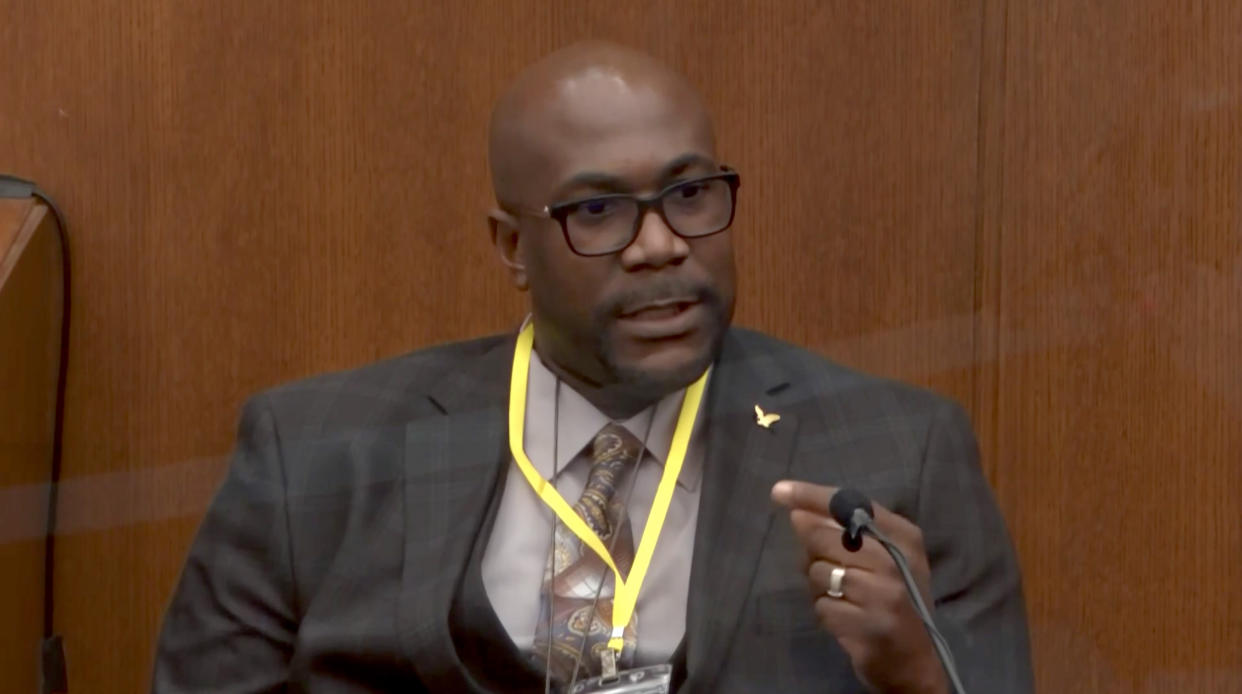
Floyd’s death was declared a homicide by the Hennepin County Medical Examiner’s Office, which concluded that the 46-year-old died from “cardiopulmonary arrest complicating law enforcement subdual, restraint, and neck compression.” The report also listed “other significant conditions,” including heart disease, fentanyl intoxication and “recent methamphetamine use.”
This week, the defense is expected to call a number of witnesses it hopes will buttress its argument that Floyd’s death was a result of multiple factors, not just Chauvin’s use of force.
“If the defense can paint a picture that simply says, ‘it's not clear that Derek Chauvin caused [Floyd’s] death,’” David Schultz, a visiting professor at the University of Minnesota Law School, told Yahoo News “[and] if the prosecution can’t convince beyond a reasonable doubt on the cause of death, it’s all over.”
Chauvin, 45, is charged with second-degree murder, third-degree murder and second-degree manslaughter in Floyd’s death.
Here are the key takeaways from the prosecution’s case.
Trial opens with 9-minute video of Chauvin kneeling on Floyd's neck
During opening statements on March 29, prosecutors showed in court the nine-minute, 29-second video of Chauvin kneeling on Floyd’s neck.
“Nine-two-nine,” prosecutor Jerry Blackwell told jurors on the trial’s first day. “The three most important numbers in the case.”
The video, taken by a bystander, shows Chauvin restraining Floyd, facedown, with his knees on his neck and back. Floyd can be heard saying “I can’t breathe” 27 times as onlookers plead with Chauvin to stop.
The footage touched off protests across the U.S. last summer. But jurors seated for the trial said during jury selection that they had not seen the video of Floyd in its entirety.
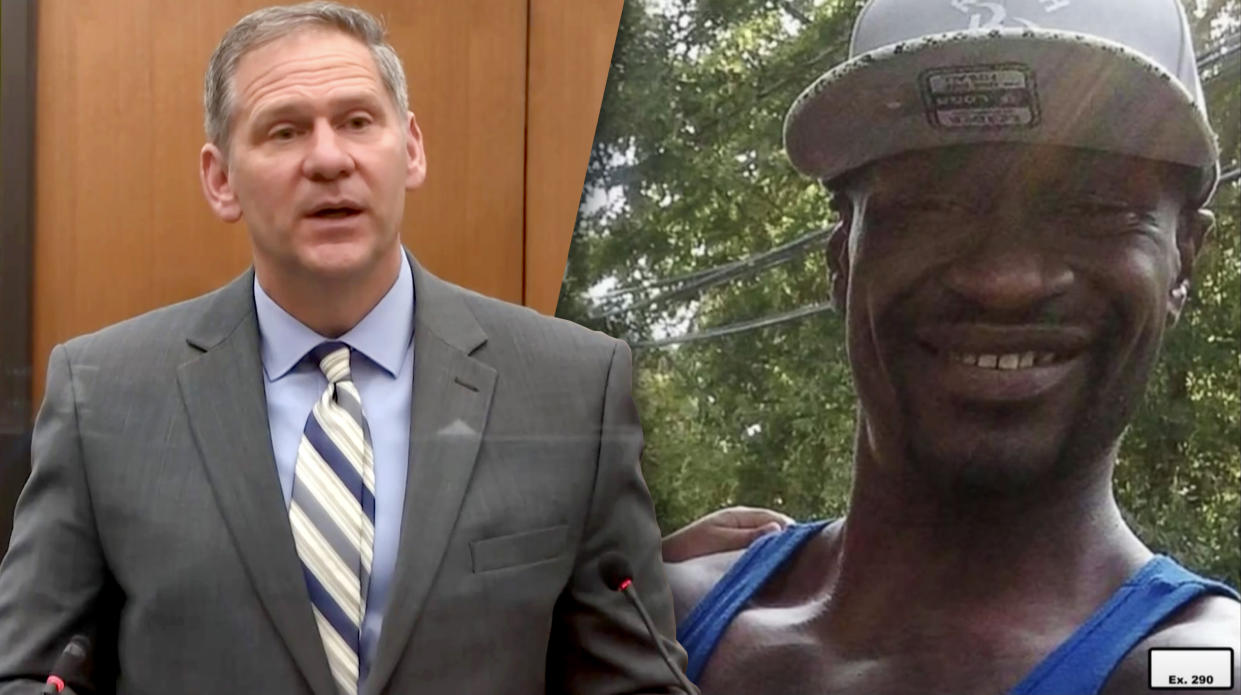
Jena Scurry, a 911 dispatcher who watched live security camera footage of the scene, was the first witness called by prosecutors. Scurry testified that as she watched Floyd lie motionless on the ground, she thought the video footage had frozen.
“My instincts were telling me that something's wrong,” Scurry said.
She became so concerned that placed a call to a police sergeant to report a possible misuse of force incident.
Witnesses recount anguish, helplessness watching Floyd's death
During the trial’s first week, some of the bystanders who watched Floyd die recalled that they felt helpless as the fateful incident unfolded. Several broke down on the stand.
Donald Williams, a student of mixed martial arts, testified that he was scared for his own safety as he pleaded with Chauvin to take his knee off of Floyd’s neck — and that he called 911 after Chauvin did not respond to him.
“I did call the police on the police,” Williams said. “Because I believe I witnessed a murder.”
Genevieve Hansen, a Minneapolis firefighter who filmed the incident while off-duty, broke down in tears as she described not being able to render aid to Floyd.
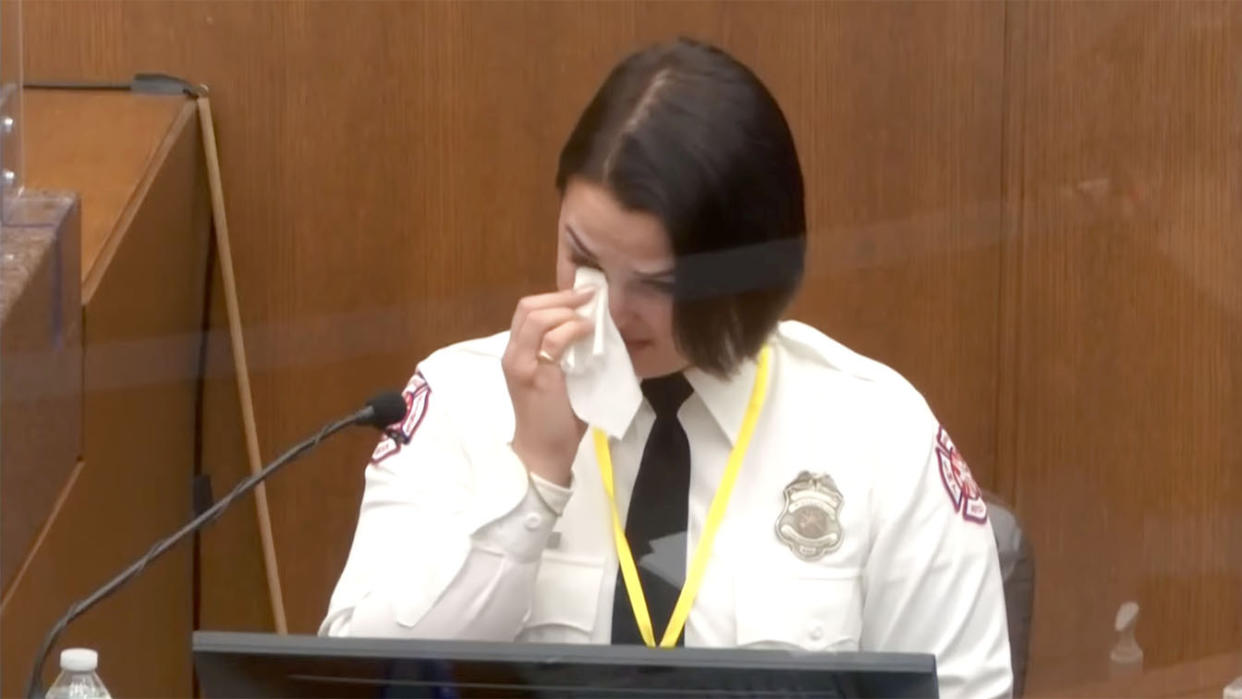
“There was a man being killed,” Hansen said, under questioning from the prosecution. “Had I had access to a call similar to that, I would have been able to provide medical attention to the best of my abilities, and this human was denied that right.”
Nelson questioned Williams and Hansen about insults they used toward the officers, seeming to suggest through his line of questioning that they made matters worse by yelling at the officers. Nelson has repeatedly raised the possibility that the crowd of bystanders were distracting to the officers at the scene. During a tense exchange with Hansen, Nelson asked her if she would be able to do her job as a firefighter if several people were yelling at or threatening her.
“I know my job,” she said, “and I would be confident in doing my job and there’s nothing anybody can say that would distract me.”
Schultz told Yahoo News that Nelson may return to the lines of argument he put forth during his questioning of Hansen.
“What he’s trying to suggest here is that, given the crowd's reaction, either A) Derek Chauvin was acting very professionally in not reacting to the crowd, or B), given the fact that he didn’t know what the crowd was going to do, he had to continue keeping George Floyd under control,” Schultz said. “[Nelson] clearly was giving the jury an alternative context for understanding what was going on.”
Store employee says Floyd appeared to be under the influence
During the prosecution’s case, the jury also heard from witnesses who interacted with Floyd before he died, including a cashier at Cup Foods, the convenience store where Floyd purchased cigarettes with a counterfeit bill before his arrest.
Christopher Martin, a 19-year-old former Cup Foods employee, was asked by prosecutors to narrate the events captured on the store’s security camera that showed Floyd interacting with staff and other customers.
“He seemed very friendly, approachable. He was talkative, just having an average Memorial Day, living his life,” Martin said. “But he did seem high.”
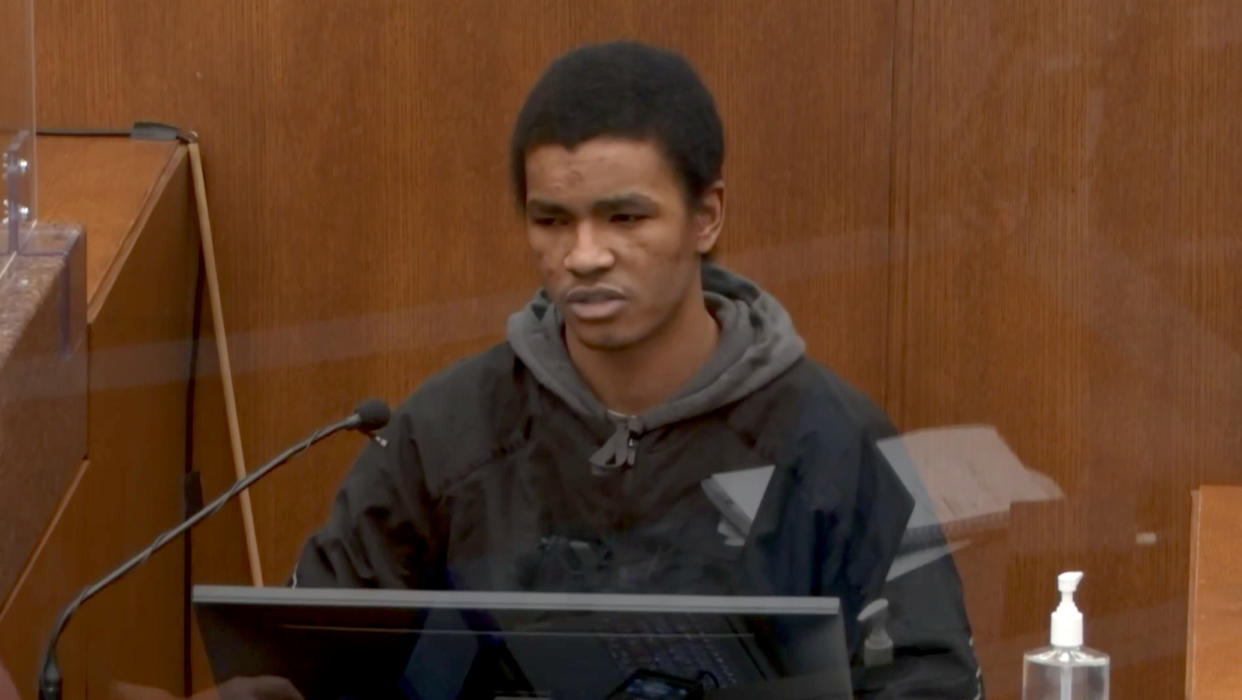
Martin testified that he believed that Floyd didn’t know the bill he used to purchase the cigarettes was fake, and told the jury that the manager at Cup Foods called the police about the counterfeit bill. He added that he had offered to use his own money to cover the debt and felt guilt over the altercation that followed after police arrived.
Prosecutors also showed body camera footage that provided a closer look at the attempts by Chauvin and his fellow officers to restrain Floyd.
As Floyd’s girlfriend takes the stand, Floyd family attorney speaks out
Courteney Batya Ross, Floyd’s girlfriend, testified that she and Floyd struggled with an opioid addiction and that Floyd used drugs while grieving the death of his mother.
A prosecution witness, Ross testified under cross-examination that Floyd was hospitalized following an overdose in March 2020, two months before his own death. Ross said she had taken Floyd to the hospital because he complained he wasn’t feeling well and that his stomach hurt. She later learned that Floyd suffered an overdose, but said she never learned what drugs had caused it.
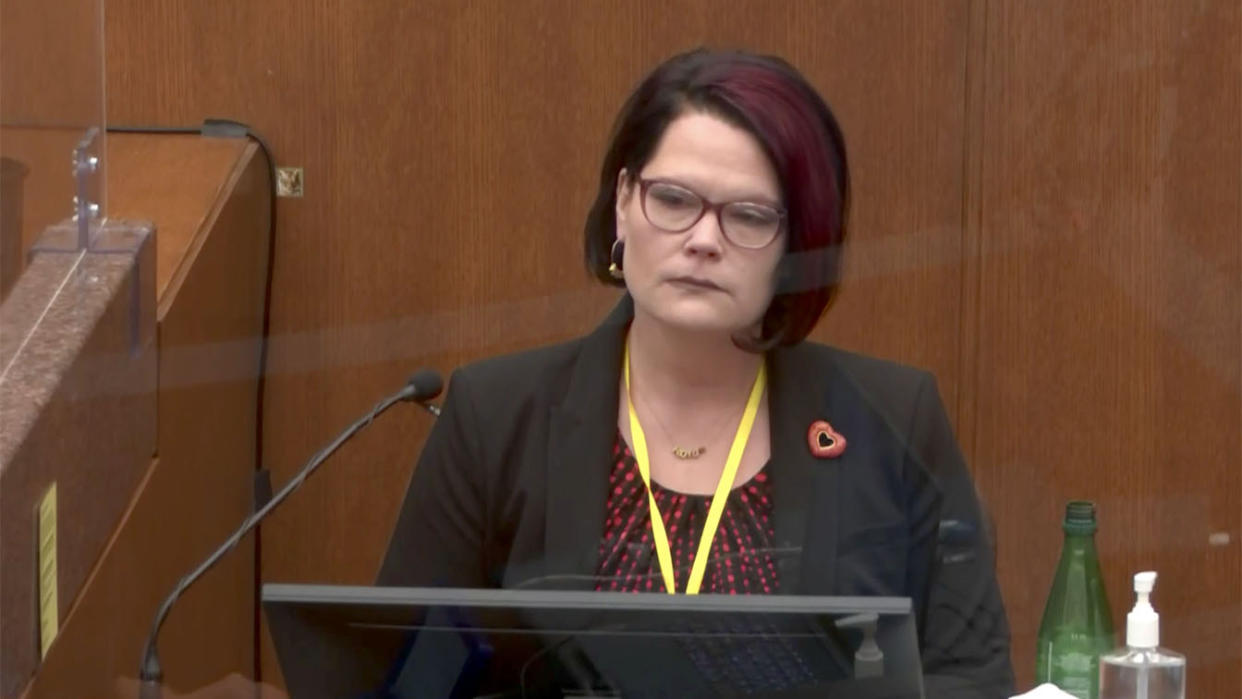
As Ross delivered her testimony, Ben Crump and Antonio Romanucci, attorneys for Floyd’s family, issued a statement to reporters that criticized the defense team for attempting to “construct the narrative” that the fentanyl discovered in Floyd’s system was the cause of his death.
“We want to remind the world who witnessed his death on video that George was walking, talking, laughing, and breathing just fine before Derek Chauvin held his knee to George’s neck,” the attorneys said in a statement.
Medical experts say Floyd died from a lack of oxygen, not a drug overdose
Last week, a number of medical experts testified that Floyd’s heart stopped due to a lack of oxygen — a direct result of the restraint on Floyd from Chauvin and his two fellow officers.
Dr. Andrew Baker, the medical examiner who performed the autopsy on Floyd, testified Friday that while heart disease and drugs had contributed to Floyd’s death, the root cause was the restraint used by Chauvin.
Baker, who was called by the prosecution, stuck firmly to the conclusion he reached last year, that Floyd died on May 25, 2020, from “cardiopulmonary arrest complicating law enforcement subdual, restraint, and neck compression.”
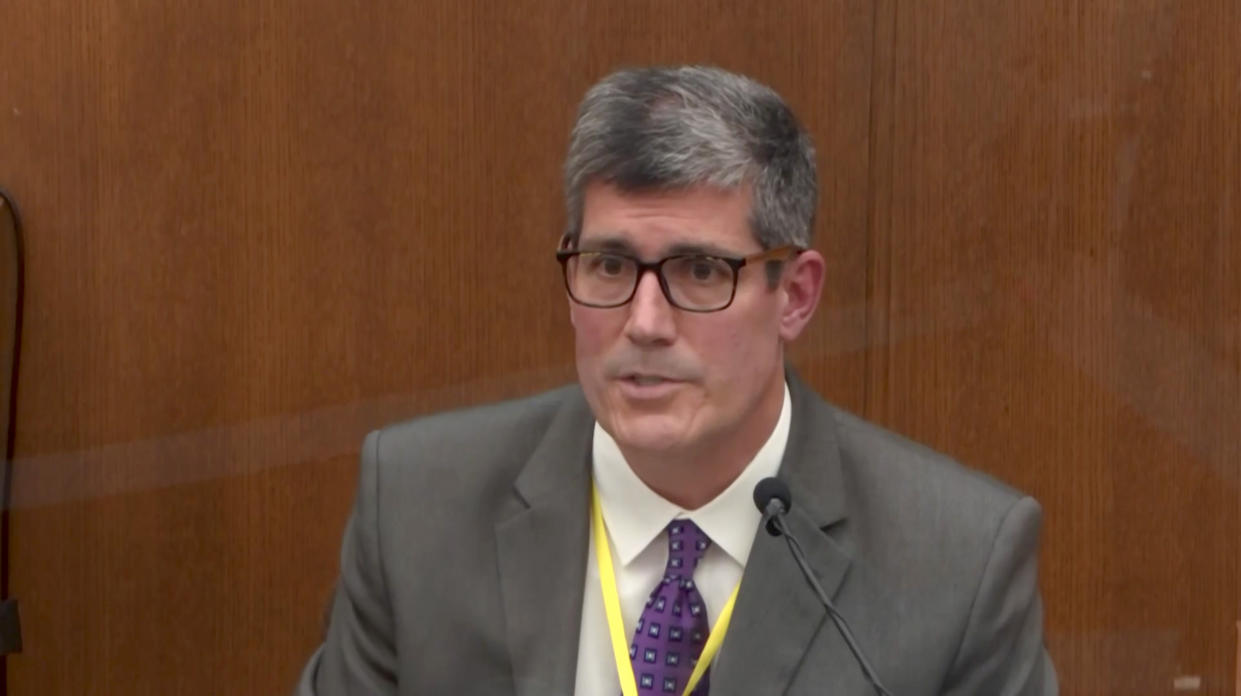
In other words, Floyd’s “heart and his lungs stopped” while he was being restrained by Chauvin and two other Minneapolis police officers, according to Baker’s testimony at Chauvin’s murder trial.
Another expert, Dr. Bill Smock, an emergency medicine physician who is not connected to the medical examiner’s office or the police, testified last week that Floyd died from “positional asphyxia,” which means there was no oxygen in his body.
Nelson sought to argue that Chauvin’s use of force was not the sole cause of Floyd’s death. During his opening statement on March 29, Nelson told the jury they would hear several interviews between law enforcement and Baker that would show that Baker “found none of what are referred to as the telltale signs of asphyxiation.”
Under questioning from Nelson, Baker said that he believes Floyd’s use of fentanyl and methamphetamine, and his heart disease and hypertension, did play a role in his death. But Baker said that was not the direct cause of Floyd’s death.
Most recently, Dr. Jonathan Rich, a cardiologist, said that Floyd ”did not die from a primary cardiac event and he did not die from a drug overdose,” according to his testimony Monday, based on medical records, videos from the day that Floyd died and the autopsy report.
”George Floyd’s death was absolutely preventable,” Rich said.
Minneapolis police officials denounce Chauvin’s use of force
Several high-ranking Minneapolis Police officials, including MPD Chief Medaria Arradondo, repudiated Chauvin’s restraint on Floyd, deeming it excessive and contrary to how city officers are trained.
“That level of force to a person handcuffed behind their back ... that in no way, shape or form is anything that’s by policy,” Arradondo testified on April 5. “And when we talk about the framework of our sanctity of life [policy], and we talk about the principles and values that we have ... that action goes contrary to what we’re talking about.”
Earlier in the trial, former Minneapolis Sgt. David Pleoger and Lt. Richard Zimmerman both testified that Chauvin went too far.
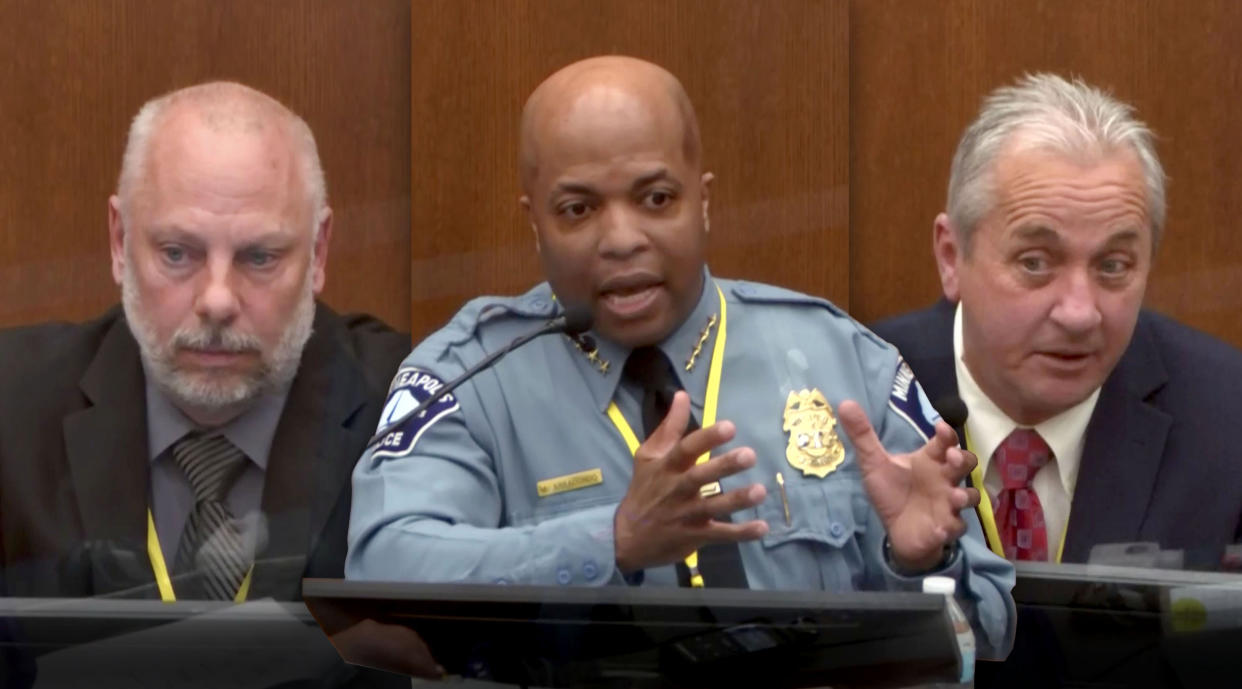
“Pulling him down to the ground facedown and putting your knee on a neck for ... that amount of time is just uncalled for,” Zimmerman said on April 2. “I saw no reason why the officers felt they were in danger, if that’s what they felt. And that’s what they would have to feel to be able to use that kind of force.”
In response to their testimony, Nelson seemed to argue through his questioning that due to their senior status, the officers may be too far removed from the use-of-force tactics that patrol officers may have to use on a more frequent basis.
“When’s the last time you got in a physical fight with a person?” Nelson asked Zimmerman.
“About 2018,” Zimmerman replied.
“So it’s been a couple of years since you’ve been in a physical fight with a person?” Nelson asked. Zimmerman agreed.
Chauvin’s defense seek to counter video footage of Floyd's death
While the prosecution built its case around video evidence and testimony from witnesses and experts, Chauvin’s defense team offered their own narrative, attempting to challenge the perception that Floyd was helpless during the incident.
Nelson described Floyd as combative and resistant, and said the evidence will show that, when confronted by police, he “put drugs in his mouth in an effort to conceal them” from the officers.
“You will see that three Minneapolis police officers could not overcome the strength of Mr. Floyd,” Nelson said during his opening statement. “Mr. Chauvin stands [at] 5-foot-9, 140 pounds. Mr. Floyd is 6-foot-three, and weighs 223 pounds.”
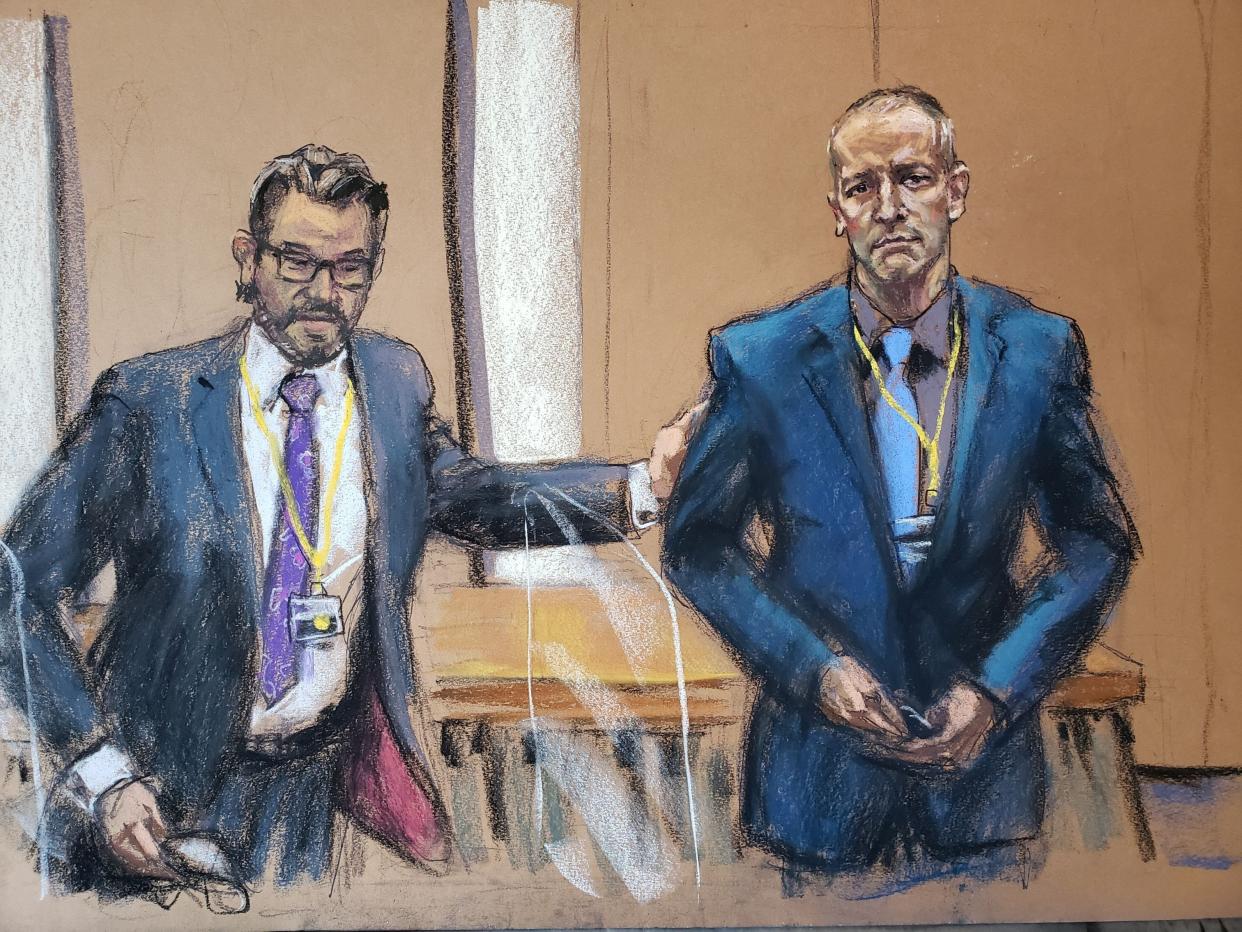
Delores Jones-Brown, a professor at John Jay College of Criminal Justice, who studies police shootings, told Yahoo News that Floyd’s resistance and the drugs that were in his system is the defense’s strongest play. She noted that in the Rodney King case, in which four LAPD officers were caught brutally beating King on video in 1991 and were later acquitted of criminal charges, defense attorneys argued that the officers believed King was on PCP.
Jones-Brown said it seems likely that the defense will continue to argue that “no matter how reprehensible you think what [Chauvin] did was, that’s not what caused Floyd’s death,” that it was a combination of multiple things.
“Rodney King was almost beaten to death,” Jones-Brown said. “But the fact that he had drugs in his system allowed the police to be acquitted in the state trial.”
Under questioning from Nelson, medical expert witnesses have acknowledged that there was fentanyl and meth in Floyd’s system, and that there was no significant bruising on Floyd’s neck.
“If I’m the defense, I just want one juror to say ‘I’m not sure,’” Schultz said.
____
Read more from Yahoo News:
